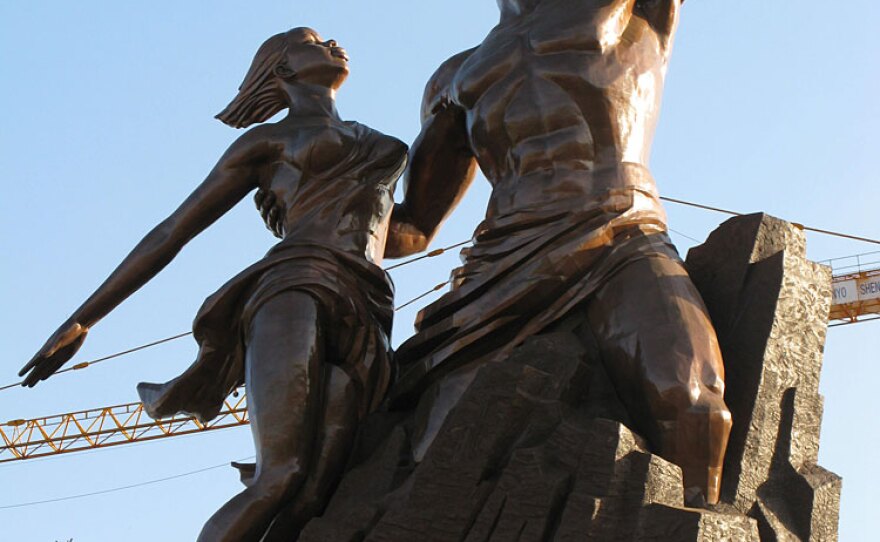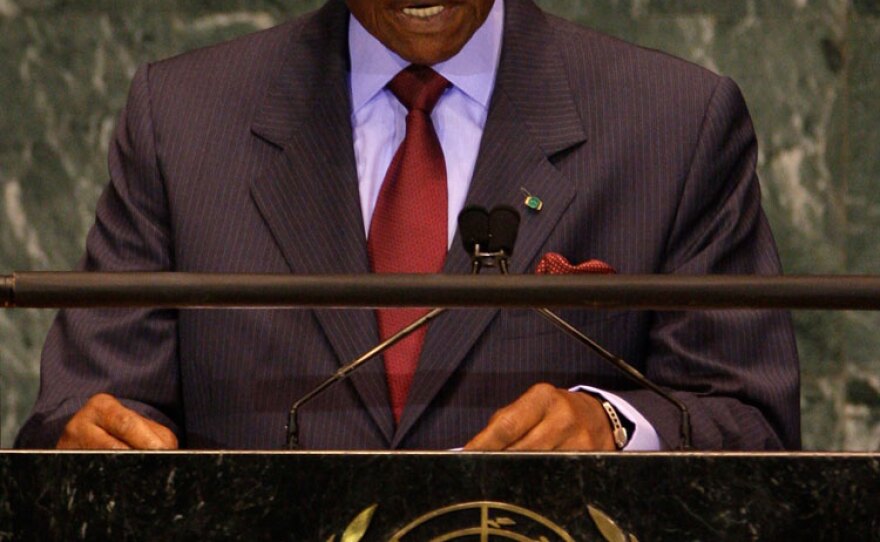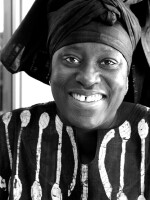It's been almost a decade since Senegal's president swept to power with an election campaign slogan of change. Abdoulaye Wade's victory ended 40 years of Socialist Party leadership in the West African nation.
Now, this Washington ally is under mounting pressure to quit. Critics accuse the octogenarian leader of mismanagement and nepotism and, lately, a towering, multimillion-dollar presidential indulgence.

It's impossible to miss Senegal's new 160-foot African renaissance monument. Perched high on a hill, the mighty Soviet-style bronze statue of a man, woman and child overlooks the Atlantic Ocean and dominates the horizon of the capital, Dakar.
A year or so in the building, the president's $27 million project is very nearly complete. Wade says the statue symbolizes the triumph of African liberation from centuries of ignorance, intolerance and racism, and he hopes it will rival the Statue of Liberty and the Eiffel Tower in Paris as a tourist destination.
But his opponents argue that the colossal creation — built by North Koreans — says more about poor governance than African renaissance.
"People are so frustrated by this," says opposition leader Abdoulaye Bathily.
Bathily says the statue is the product of a power-drunk president. "The economy has collapsed. ... The education system is in a crisis. The health system is in crisis. And yet Abdoulaye Wade is squandering public money," Bathily says. "So all these things, people are seeing it, and it is creating so much frustration."
Opposition In The Streets
Bathily and other prominent opposition politicians recently led an anti-Wade protest rally.
Thousands of Senegalese gathered on the street for the demonstration — not a common occurrence in the country. The protesters said they were marching against corruption, poor governance and the poor delivery of services.
One of the demonstrators, Mary Peter, said the Senegalese were at their wits' end, because they were going hungry and didn't have jobs and houses. She said Wade just doesn't get it — and the protesters were telling him to go.
In recent years, Senegal has gained a reputation for hemorrhaging thousands of migrants, mainly young men. They risk their lives on the high seas, crossing in rickety boats, heading to Europe and beyond in search of a better life.

For decades, this poor, peanut- and fish-exporting former French colony was hailed as a bastion of democracy in West Africa, with close links to Washington. In September, Senegal was awarded a $540 million grant from the United States as a reward for — and to encourage — good governance.
Wade's supporters dismiss the president's critics. Local government minister Aliou Sow says the president has done much for Senegal.
"President Wade is a democrat. Ten years in power — how many hundreds of kilometers of roads are built? How many thousands, I say, of classrooms are built? How many high schools are built? How many new universities are built? Etc., etc.," Sow says. "President Wade gave them. You see what I'm talking about? People must be fair."
Religious Backlash
But the renaissance monument has come to symbolize opposition to Wade in this predominantly Muslim country. In recent Friday sermons, imams criticized it as idolatrous.
Some said the statue — featuring a muscular, bare-chested father figure sweeping a scantily clad woman, revealing part of her breasts and thighs, behind him and holding aloft a nude child — contravened Islamic teachings by presenting the human form as an object of worship.
Last week, the president sought to deflect criticism from Muslim religious leaders by arguing that Christians prayed to a "man called Jesus Christ." He had to apologize to Senegal's Christian minority for comparing Jesus to the statue. The Roman Catholic cardinal of Dakar, Monsignor Theodore Adrien Sarr, said they had been "shaken and humiliated" by the comparison.
Standing at the base of the colossus, Aisha Ndow, 16, says she considers the statue un-Islamic, unbecoming and aesthetically un-African.
"Look at the woman — half her body is uncovered. You can see her breasts and her bare thighs. That's not good for a Muslim," she says. "Really, this is not a good example for Africa — especially the way they're dressed. The father, you can see his body. The child is completely naked. There's too much nudity. The woman should be wearing something more proper, to show how Africans really dress."
Wade's claim that he's entitled to 35 percent of any revenues generated from tourism from the monument has sparked further outrage.
"He was the hope of Senegal, but he dashed all this hope the people placed on him," says Bathily, the opposition leader. "And over the last nine years, step by step, he has established a personal rule in Senegal today."
The next presidential election is still two years away, but Wade — a veteran political survivor — has already announced his intention to run. Analysts predict that winning, as he first did in 2000, with a clear victory could be a monumental challenge.
Copyright 2022 NPR. To see more, visit https://www.npr.org. 9(MDAzMjM2NDYzMDEyMzc1Njk5NjAxNzY3OQ001))







